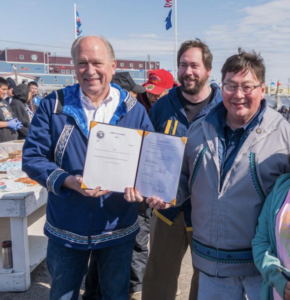TWO YEARS LATER, JUDGES SAY MISTAKES HAPPEN IN ELECTIONS
In the summer of 2016, the Primary Election went sideways across several communities in the rural north. In Shungnak, the election supervisor allowed every voter to vote two ballots — a Republican ballot and a Democrat ballot. In Ambler, votes went missing, and in Browerville, the election officials made Republicans vote a Democrat ballot if they were voting a questioned ballot.
The Division of Elections certified Westlake as the winner that September by an eight-vote margin, something that was not appropriate, according to critics. A lower court reversed it, but the Supreme Court upheld it in October of 2016 and said it would publish its opinion later.
It published its reasoning two years later, on Aug. 31, 2018. In the majority opinion of the court, the situation in Shungnak was an error on the part of the election worker, and such an error should not disenfranchise voters of their rights.
The voting anomaly was first identified by Must Read Alaska in 2016, when we noticed that 102 ballots had been cast by 51 people. We also reported that a similar anomaly occurred in Kivalina, and in Buckland, far too many “special needs” ballots had been cast — far more bedridden voters cast ballots than in all of populated Wasilla.
It appeared to this writer that voter fraud was occurring throughout District 40, and it had changed the outcome of the election, and thus, the power balance in the House of Representatives.
Nageak’s investigation, with the aid of the Alaska Republican Party, uncovered much more, and it was all given to the court.
But the judges wrote that mistakes happen:
“It is undisputed that all voters in Shungnak received and cast both the ADL and the Republican ballots. This was an error by Shungnak election officials. Nageak argues that we should not count any of the 51 votes from Shungnak, or alternatively, that we should proportionately reduce the number of Shungnak votes as the superior court did in the election contest. We conclude that challenges to elections based on election official error that go beyond the facial validity of the votes cast may not be brought under Alaska’s recount statute and therefore decline to discard the Shungnak votes on this basis.”
[Read the entire opinion and the dissenting opinion here.]
THE BEAT GOES ON
In 2016, the campaign manager for Dean Westlake was John-Henry Heckendorn, who is now the campaign manager for Gov. Bill Walker in his bid for re-election.
Heckendorn was the main witness to defend Westlake’s illegitimate win in District 40, while Randy Ruedrich spoke on behalf of the Nageak position.

Westlake took office and went on to be accused by a woman in Juneau of sexual harassment. He was forced to resign after just one year in office. That woman, who was a legislative aide at the time, stated to a meeting of the Alaska Democratic Party that the party had not listened to her and others prior to the election, when the party was told that Westlake was a known harasser of women going back well before his time in public office.